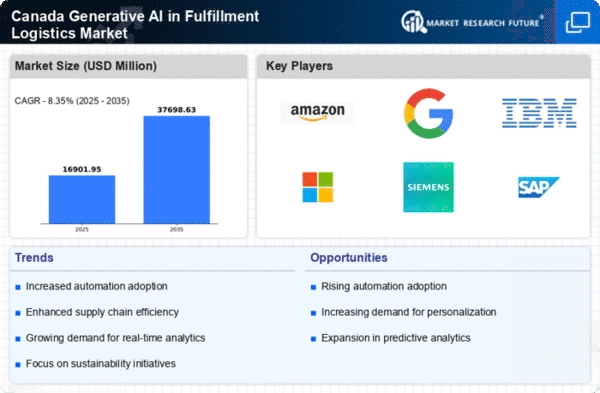Technological Advancements in AI
Technological advancements in artificial intelligence are significantly influencing the generative ai-in-fulfillment-logistics market. Innovations in machine learning, natural language processing, and data analytics are enabling logistics companies to automate and optimize their operations. In Canada, investments in AI technologies are projected to exceed $15 billion by 2026, reflecting a growing recognition of AI's potential to transform logistics. These advancements facilitate predictive analytics, allowing businesses to forecast demand more accurately and manage inventory effectively. Moreover, AI-driven solutions can enhance route optimization, reducing delivery times and costs. As companies increasingly adopt these technologies, the generative ai-in-fulfillment-logistics market is likely to experience substantial growth, driven by the need for efficiency and responsiveness in logistics operations.
Focus on Sustainability and Efficiency
The growing emphasis on sustainability is reshaping the generative ai-in-fulfillment-logistics market. Canadian consumers are becoming more environmentally conscious, prompting businesses to adopt greener practices. In 2025, it is estimated that 70% of consumers prefer brands that demonstrate a commitment to sustainability. This shift is leading logistics companies to explore AI-driven solutions that optimize resource usage and minimize waste. Generative AI can assist in creating more efficient supply chains, reducing carbon footprints through better route planning and inventory management. As companies strive to meet consumer expectations and regulatory requirements, the integration of generative AI in fulfillment logistics is likely to become a key strategy for achieving sustainability goals while maintaining operational efficiency.
Rising Demand for E-commerce Solutions
The increasing shift towards e-commerce in Canada is driving the generative ai-in-fulfillment-logistics market. As consumers increasingly prefer online shopping, businesses are compelled to enhance their logistics capabilities. In 2025, e-commerce sales in Canada are projected to reach approximately $50 billion, indicating a robust growth trajectory. This surge necessitates advanced fulfillment solutions that can efficiently manage inventory, optimize delivery routes, and reduce operational costs. Generative AI technologies are being integrated to streamline these processes, enabling companies to respond swiftly to changing consumer demands. The ability to analyze vast amounts of data in real-time allows for improved decision-making, which is crucial in a competitive market. Consequently, the demand for generative AI solutions in fulfillment logistics is expected to rise significantly, as businesses seek to enhance their operational efficiency and customer satisfaction.
Labor Shortages in the Logistics Sector
Labor shortages in the logistics sector are emerging as a critical driver for the generative ai-in-fulfillment-logistics market. In Canada, the logistics industry faces a significant workforce gap, with estimates suggesting a shortfall of over 30,000 workers by 2026. This shortage compels companies to seek automation solutions to maintain productivity and service levels. Generative AI technologies can automate various tasks, from inventory management to order processing, thereby alleviating the pressure on human resources. By leveraging AI, companies can enhance their operational capabilities while addressing labor constraints. As the demand for efficient logistics solutions continues to grow, the generative ai-in-fulfillment-logistics market is likely to expand in response to these workforce challenges.
Government Initiatives Supporting AI Adoption
Government initiatives aimed at promoting AI adoption are playing a pivotal role in the growth of the generative ai-in-fulfillment-logistics market. In Canada, various programs and funding opportunities are being introduced to encourage businesses to integrate AI technologies into their operations. The Canadian government has allocated over $1 billion to support AI research and development, which is expected to benefit the logistics sector significantly. These initiatives not only provide financial support but also foster collaboration between industry and academia, facilitating innovation. As businesses take advantage of these resources, the adoption of generative AI in fulfillment logistics is likely to accelerate, enhancing competitiveness and operational efficiency in the market.
















